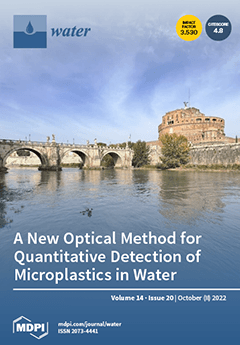Due to their cost-effectiveness, low toxicity, and naturally renewable properties, bio-coagulants for water treatment are gaining popularity. In this context, four bio-coagulants were tested for their ability in turbidity reduction in a synthetic bentonite suspension:
Opuntia ficus indica (OFI) and
Moringa oleifera (MO)
[...] Read more.
Due to their cost-effectiveness, low toxicity, and naturally renewable properties, bio-coagulants for water treatment are gaining popularity. In this context, four bio-coagulants were tested for their ability in turbidity reduction in a synthetic bentonite suspension:
Opuntia ficus indica (OFI) and
Moringa oleifera (MO) seeds, two well-established vegetal materials in the domain of bio-coagulation, and Algerian
Aloe vera (AV) and
Pinus halepensis seeds (PHS), both of which have received very few or no study in turbidity reduction in water and wastewater. A comparative study was conducted with regard to two well-known inorganic coagulants, ferric chloride and Alum. Extraction salts, pH, coagulant dose, initial turbidity, and aging effects were examined. When compared to chemical coagulants, the four bio-coagulants worked very well, removing approximately 100% of the turbidity at natural pH of 7.5 using optimal doses of 1.5, 3, 3, 3.5, 1.5, and 1.5 mL/200 mL for AV, OFI, MO, PHS, Alum, and FeCl
3, respectively, at a broad range of pH (2 to 8), and causing no pH alteration of the treated water. Polysaccharides and proteins involved in inter-particle bridging and charge neutralization may be the active coagulation-flocculation molecules. The four bio-coagulants produced less sludge amount than Alum and Ferric chloride. This research not only shows that MO and OFI are effective in eliminating turbidity, but it also highlights the great potential of Algerian AV and PHS seeds as promising bio-coagulants in the treatment of polluted water.
Full article





